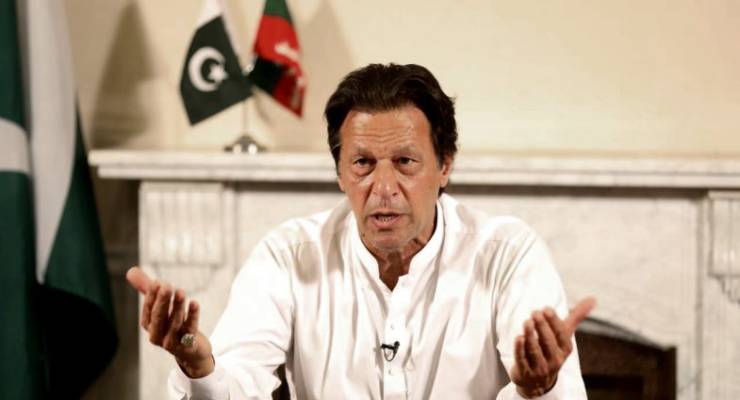
Pakistan cricketing great Imran Khan, who has been in politics since founding the Pakistan Tehreek-e-Insaf (PTI, or Pakistan Justice Movement) in 1996, is truly one of the greatest all-rounders after becoming the country’s new prime minister. The result, following the July 25 election, is only the second democratic handover of power in 71 years.
The PTI ran over the top of the the incumbent government with about 50% of voting officially counted, in an election where Pakistanis voted for both federal and four provincial parliaments. The PTI defeated the Pakistan Muslim League (PMI-N) — formerly led by three-time prime minister Nawaz Sharif, who won a third term in 2013 until his imprisonment earlier this month — as well as the third-placed Pakistan Peoples Party (PPP). The latter is led by political scion Bilawal Bhutto Zardari, son of former PM Benazir Bhutto and her husband former (ceremonial) president Asif Ali Zardari.
With preliminary results from 228 of of the 272 National Assembly constituencies now in, the PTI is leading the race with 108 seats followed by the PMI-N with 58. PPP looks strong in the third spot with 28 seats, and minor parties picked up 12 seats.
PTI also appear to have secured a narrow victory in the Punjab, the largest of the four provinces that contains about half of Pakistan’s 204 million population, according to news publication Dawn.
Ahead of the poll, the PML and PTI appeared to be neck-and-neck, but Khan’s campaigning for change and an end to corruption has hit a nerve. Many Pakistanis indicated there was “silent support” for a change in government. Rivals, led by PMI-N President Shahbaz Sharif, have cried foul at delayed counting and alleged ballot box rigging, but the Election Commission has declared the result 100% fair.
The election was, however, marred by a bomb at a polling station in the city of Quetta which killed at least 31 people. Responsibility for the attack has been claimed by the so-called Islamic State. A series of bomb blasts also killed at least 200 people at political rallies in the lead-up to the election. Most were claimed by IS and the Taliban, which is widely understood to run its operations in Afghanistan from northern Pakistan.
There were also allegations of corruption and interference by the military — who have run the country at various times in the decades after independence and whose backing is crucial for a new government. On July 19, Islamabad High Court judge Shaukat Aziz Siddiqui accused Pakistan’s notorious spy agency, the Inter-Services Intelligence (ISI), of gross interference in judicial functioning.
To top it off, then-prime minister Nawaz and his daughter Maryam Sharif were convicted in absentia on corruption charges while out of the country in June. Yet they returned to the country on July 13 to turn themselves in and are now in jail for 10 and seven years respectively. They have accused the military and judiciary of cooking up the charges, yet their decision to return was seen by most observers see as a boost for the government. In the end it wasn’t enough to keep the PMI-N in power.
The result is likely to trigger widespread concerns across the region and beyond as Khan is also rumoured to be close to the Taliban — something he has strenuously denied.
This year, Australia joined those concerned about Pakistan. In May, Foreign Minister Julie Bishop visited the country’s capital Islamabad for the first time in her five years in the job and pledged AU$24 million in aid (from Australia’s existing and shrinking aid budget) to help border areas hit by conflict and natural disasters.
“In relation to Daish (the Arabic acronym for the so-called Islamic State), we are deeply concerned about the rise of this terrorist organisation that appears to be more dangerous, more complex, more global in its ambitions and reach than perhaps we’ve seen before,” Bishop said.
This is the nub of global concerns about the election result. Pakistani observers inside the country say Khan’s win will mean the new government is something of an unknown quantity. Khan must also balance a fading alliance with the United States with its growing economic relationship and friendship with China, while dealing with rising radicalism at home and in neighbouring Afghanistan.
In his victory speech, Khan called for the repair of corrupted institutions and an increase in foreign investment. But despite saying all the right things, he has a long road ahead.








Second democratic handover? What the …?
Where is Dr Shakira Hussein when we need her?
Isn’t one of the Crikey editors of South Asian heritage?
In the age of Trump Im the Dim should fit right in..
Benazir was intended to be acceptable face the West of Pakistan corruption & venality but that plan went slightly awry. Twice, the last time terminally.
Khan is just another in the same mould, to assure investors that the country is open for business, subject to the special advisors’ taxes.
Oh, come onnn!
Not the dreaded Friday evening, 48hrs + moderation!